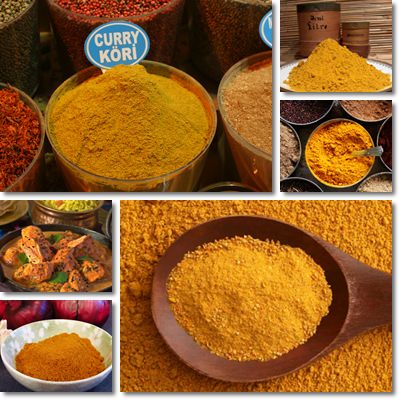A wildly popular spice mix, curry powder is a great way to add special flavor to your dishes and enjoy the wonderful health benefits that each spice in the mix offers you.
Benefits range from burning fat deposits for weight management and offering antioxidant protection to boosting immunity, reducing inflammation and improving digestion and cognition.
Each constituent of the mix holds the potential to improve one or more aspects of both physical and mental health. And the choice of spices in curry mixes makes a huge differences in the resulting health benefits.
Curry powder mixes incredibly healthy ingredients such as turmeric, coriander, cumin, mustard seeds, ginger, pepper, garlic and other local spices, depending on the country where it is produced and used. Not only does the mix boast amazingly healthy ingredients, full of vitamins, minerals and antioxidants, but it also comes in both pungent and mild forms, the latter being more suitable for more sensitive palates and stomachs that do not enjoy or draw any benefit from the spiciness of certain ingredients.

What is curry and what are the ingredients in curry powder?
Curry is a famous spice mix used to add flavor (and hotness) to various dishes in South Asian cuisine. Over time, the mix has been adopted by other cuisines and is now available in most parts of the world as curry powder. This mix has several basic ingredients namely turmeric, cumin, coriander, to which several other ingredients are added depending on the culinary specificity of each country.
Thus curry powder may contain a variety of other herbs and spices such as garlic, allspice, white or black pepper, ground mustard seeds, ginger, cloves, bay leaves, cumin, cinnamon or even red hot chili peppers.
Considering the wide variety of herbs and spices, curry powder ranks as one truly healthy spice mix which shouldn’t be missing from our diet. Turmeric, for example, contains curcumin, a potent antioxidant, anti-inflammatory and anti-arthritic agent and is an incredible source of vitamin B6, iron and manganese. Black pepper is rich in copper and manganese, two powerful antioxidant-minerals, while ginger has proven efficient against the Helicobacter pylori bacterium.

What are the benefits of eating curry?
Below is a list of reasons why curry powder is good for you:
Good for arthritis joint pain and swelling
Turmeric, the main ingredient in curry powder, has been shown to reduce swelling and relieve pain associated with joint inflammation in arthritis. Regular consumption is said help improve arthritis pain, but also muscle pain and help reduce overall inflammation levels in the body. Experts recommend adding the spice to food at the end of the cooking process, to limit its exposure to cooking heat which may cause it to lose its properties.
Promotes cognitive health
According to researchers, turmeric, the major ingredient in curry powder, can significantly reduce the risks of developing Alzheimer’s Disease and other neurodegenerative diseases. This is due to curcumin, a compound in turmeric which prevents proteins called beta-amyloid from binding into plaques or pieces which may accumulate between nerve cells and prevent them from communicating with each other. This is believed to be the major cause for memory loss in Alzheimer’s patients.
Anticancer properties
The spices which make up curry powder, notably turmeric, show exceptional antioxidant activity and studies suggests that regular consumption of curry may reduce the risk of developing prostate, breast and skin cancer. Ongoing research also indicates that turmeric may stop the progression (proliferation) of tumor cells.
See the benefits of turmeric.
Nevertheless, keep in mind that eating curry alone will not decrease all cancer risks. Good overall lifestyle and dietary habits that include not smoking, not drinking, not eating highly processed foods, avoidance of pollution as well as limiting stress are crucial elements for a long, healthy life. No single food is a universal cure for cancer or any other disease for that matter; but it helps to take care of yourself and live a healthy, clean life.
Boosts immunity
Curry powder is rich in nutrients such as vitamins A, C and B6 which work together to protect the body from viruses and bacteria by maintaining a healthy immune system. For example, vitamin A ensures that the mucous membranes in our eyes, nose, mouth, throat, lungs and stomach, which are directly exposed to the outside world by means of the air we breathe and water or food we ingest, are healthy and can efficiently fight off the threats they are exposed to. Vitamin B6 (pyridoxine) maintains healthy immune system organs (or lymphoid organs) such as the tonsils, spleen or lymph nodes and makes sure they produce sufficient white blood cells to ensure a good immune response when needed.
Great digestion aid
Spices traditionally used to make curry powder such as anise, allspice, cardamom and black pepper are known to help relieve digestive discomfort and treat constipation, loss of appetite and abdominal cramps. Ginger is also a great antiemetic, very useful for treating nausea and preventing vomiting. Black pepper increases intestinal motility and promotes the secretion of gastric enzymes which aid digestion. Cloves alleviate flatulence, mask bad breath and are quite efficient in preventing the infestation with intestinal worms.
Helps burn fat
Thanks to its black pepper content, curry powder enhances metabolism by issuing the breakdown of fat cells in fat deposits, potentially contributing to weight loss. While curry alone will definitely not make you drop pound after pound, it can be a step forward in healthy eating and help set the pace for healthy weight loss.
Improves skin appearance and delays aging signs
Curry is a mix of antioxidant-rich spices which stimulate collagen production (vitamin C) and thus prevent premature aging signs such as wrinkles. Moreover, it contains natural compounds (curcumin) which protect the skin against the visibly damaging effects of exposure to air pollutants. Other compounds (potassium) regulate body fluids and thus counteract visible symptoms of water retention such as puffy face or swollen legs. However, know that if used topically, it can cause irritation, redness and rashes.
What are the side effects of Curry?
Depending on the ingredients in curry and individual sensitivities or instances of intolerance to various foods or components in food, eating curry may result in the following side effects:
Digestive upset
Even without an underlying digestive condition, it is possible to experience digestive upset after eating curry. Symptoms may include stomach pain such as belly button pain or upper abdominal pain (that is, pain felt in the upper part of the abdomen, above the belly button), but also abdominal cramps, heartburn or burning sensation in the middle of the stomach due to indigestion, regurgitation of stomach acid, a bad acidic or metallic taste in the mouth, even loose stools and diarrhea, nausea and vomiting.
Acid reflux with heartburn
Symptoms of acid reflux include heartburn (a burning sensation in the chest area, around the heart), regurgitation of stomach acid and a sore throat and a burning sensation in the throat, a bad acidic, sour or metallic taste in the mouth, bad breath, disturbed sleep such as waking up from your sleep because of heartburn or regurgitation of stomach contents (find out more about acid reflux at night) and also coughing, nausea and vomiting in the morning when you wake up.
Gastritis flareup
If you have gastritis, then eating spicy foods such as curry which has garlic, turmeric, ginger and pepper is going to flareup your condition. Symptoms may include stomach pain, burning sensation in the center of the abdomen, around the belly button or above, heartburn, sore throat and a bad taste in the mouth as a result of acid reflux causing regurgitation of stomach contents, but also bloating, burping, hiccups, nausea, vomiting, early satiety and appetite loss.
Hemorrhoids flareup
Hemorrhoids don’t respond well to spicy food so eating too much curry can cause a hemorrhoids flareup with side effects such as itching, pain, irritation and even bleeding. Discomfort can become so severe you can’t even sit.
Intolerance symptoms
Eating curry can cause side effects such as a skin rash, dermatitis and eczema, stomach upset, indigestion, nausea, vomiting, bloating, gas, loose stools and diarrhea, mouth ulcers, even swelling of the face as symptoms of food intolerance. It may be an intolerance to any of the components in curry such as turmeric or curcumin in turmeric, garlic, ginger etc.
Also read about the 5 reasons why turmeric is bad for you.
Risk of allergic reaction
It is possible to be allergic to curry or, more exactly, to one or more components in curry such as turmeric, ginger, mustard seeds, chili peppers etc.
Also see these common 7 side effects of hot chili peppers.
Conclusion
If you are not a big fan of spicy mixes, you can always choose milder varieties, with less of some ingredients and more of others. Keep in mind that ingredients can vary immensely, depending on the brand. You can always mix your own curry powder and enjoy a healthy, homemade mix to your liking. However, as with all things, moderation is crucial so we can enjoy all the health benefits of the spices, without the side effects.
